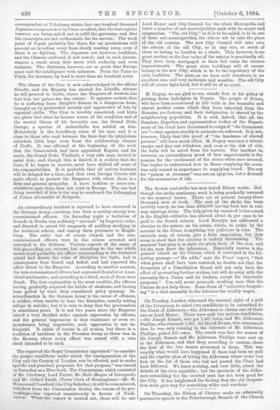An extraordinary incident is reported to have occurred in the
German Army,—nothing less than a mutiny among non- commissioned officers. On Saturday night a battalion of Guards in Berlin was suddenly " alarmed" by Imperial order, and directed to arrest 180 sergeants of artillery studying in the technical school, and convey them prisoners to Magde- burg. The order was of course obeyed, and the non- commissioned officers were in due course arrested and conveyed to the fortress. Various reports of the cause of this proceeding are current, but according to the one which seems most probable, the officer commanding in the technical school had drawn the reins of discipline too tight, had in consequence been hissed and defied, and had reported the affair direct to the Emperor. According to another account, the non-commissioned officers had expressed Socialist or Anar- chical sentiments; and according to a third, most of them were drunk. The first explanation is the most credible, the officers having gradually acquired the habits of students, and having been galled by what they considered petty tyranny. In- subordination in the German Army is the rarest of offences, a soldier, when unable to bear the discipline, usually taking refuge in suicide; but it is vain to deny that the provocation is sometimes great. It is not two years since the Emperor issued a very decided order against oppression by officers, and the general impression is that resistance or even re. monstrance being impossible, such oppression is not in- frequent. It exists of course in all armies, but there is a tradition of hardness in the Prussian Army as there was in the Roman, where every officer was armed with a vine stock intended to be used.






































 Previous page
Previous page